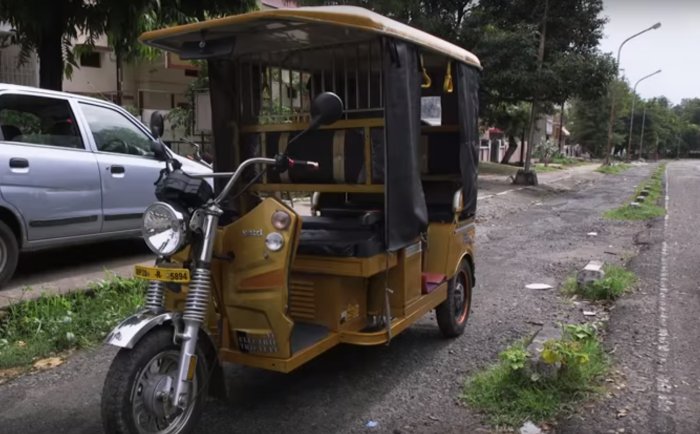It’s hoped solar energy technology will help power a switch in India from particulate belching auto-rickshaws to zero emissions electric models.
As we mentioned last week, India’s capital Delhi is in the grips of an air pollution emergency. The situation is at a stage that officials are reportedly planning to spray water over parts of the city in an attempt to help “scrub” the air of fine particulates.
One of the sources of fine particulate emissions are Delhi’s auto-rickshaws, most of which are powered by two-stroke petrol engines. As two-stroke engines burn a petrol and oil mixture, they generate more carbon monoxide, hydrocarbons, and particulate matter than four-stroke engines. Two-stroke engines are significant sources of PM2.5 pollution; particles that are up to 30 times smaller than the width of a human hair and can penetrate deep into the lungs.
In another Indian city, Jabalpur, solar technology company ABB has been working with local authorities on an initiative to promote the use of zero-emission electric rickshaws (e-rickshaws) and solar powered charging stations.
While e-rickshaws have been present in the city since 2008 and there are currently around 400 licensed operators in the city, the lack of affordable, publicly accessible charging stations has been a barrier to more rapid uptake.
The cost of recharging a rickshaw’s batteries from mains supply is around 40 to 50 Indian rupees, which is approximately AUD 80c – $1.00. It’s cheaper than petrol, which is around AUD$ 1.38 per litre currently; but mains grid charging also means emissions from the coal-fired power stations that supply Jabalpur with electricity.
Under the pilot project, Jabalpur authorities are installing nine solar-powered charging stations to be used by the city’s licensed rickshaw owners, with the first installation completed earlier this year.
The charging stations are 50 kilowatts capacity and can recharge up to four e-rickshaws simultaneously. It takes 7 to 8 hours for a full recharge, providing 100 to 150 kilometers of range. The cost of a recharge is around AUD 60 cents – so approximately 25% – 40% less than mains grid charging – and also faster.
Surplus electricity generated by the charging station solar array is fed back into the mains grid. Whether these systems feature any sort of energy storage isn’t clear.
ABB is contributing to the project by supplying ABB solar inverters for the systems.
“Currently, some 5,000 petrol rickshaws are still operating in Jabalpur, burning through 20,000 litres of fuel a day. That’s 46 tonnes of CO2 that would be removed from circulation every day by upgrading those vehicles to e-rickshaws,” says ABB. “Multiply that by the quarter-million auto-rickshaws now operating throughout India, and the country could avoid more than 2 million tonnes of carbon emissions a day by converting to electric rickshaws.”
It’s not just the carbon reduction that is important, but also the reduction in particulate matter. No doubt other cities in India and elsewhere in the world where auto-rickshaws operate will be watching Jabalpur’s pilot program with great interest.


 RSS - Posts
RSS - Posts



What are the specifications of the “e-rickshaws”, and, are they likely to ever make it to Australia?
Sun Run Motors is providing even a better solution for this. They have launched Solar-Powered Electric Rickshaw in India. These rickshaws are equipped with solar panels which are specially made for electric vehicles. These rickshaws charge throughout the day while running on the road. They are world’s most efficient solar-powered rickshaws that run 50 to 70 kms in a day on solar energy.
Details: http://www.sunrunmotors.com
Facebook: https://www.facebook.com/solar.powered.electric.vehicles